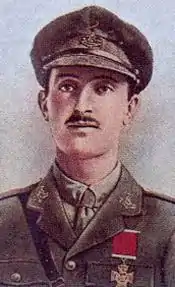Donald Simpson Bell
Second Lieutenant Donald Simpson Bell, VC (3 December 1890 – 10 July 1916) was an English school teacher and professional footballer. During World War I he was awarded the Victoria Cross for actions during the Battle of the Somme in mid-1916.
Donald Simpson Bell | |
|---|---|
 Donald Simpson Bell as depicted on a cigarette card. | |
| Born | 3 December 1890 Harrogate, West Riding of Yorkshire, England |
| Died | 10 July 1916 (aged 25) near Contalmaison, France |
| Buried | Gordon Dump Cemetery, France |
| Allegiance | |
| Service/ | |
| Years of service | 1915–1916 |
| Rank | Second Lieutenant |
| Unit | Green Howards (Alexandra, Princess of Wales's Own Yorkshire Regiment) |
| Battles/wars | World War I |
| Awards | Victoria Cross |
| Other work | Teacher Footballer |
Football
Bell was born on 3 December 1890 to Smith and Annie Bell, who resided in Queen's Road, Harrogate. He attended St Peter's Church of England Primary School and Harrogate Grammar School before going to Westminster College. A noted sportsman at college while studying he played as an amateur with Crystal Palace and later for Newcastle United. He returned to Harrogate and became a schoolteacher at Starbeck Council School (now Starbeck Primary School) and a member of the National Union of Teachers,[1] and to supplement his salary in 1912 he signed professional forms with Bradford (Park Avenue). He played 6 games for the club in a midfield role between 1912-14. He had previously also been linked with Crystal Palace. His story is contained in the book Lost Football Heroes of the First World War.[2] He played as a defender or midfielder.[3] He was married to Rhoda Bell.[4]
World War I
When World War I broke out, he became the first professional footballer to enlist into the British Army – joining the West Yorkshire Regiment in 1915.[5] He was rapidly promoted to Lance Corporal and then was commissioned into the 9th Battalion, Green Howards (Alexandra, Princess of Wales' Own Yorkshire Regiment) in 1915. He was awarded the Victoria Cross for his actions on 5 July 1916 at Horseshoe Trench, Somme, France.[6]
For most conspicuous bravery. During an attack a very heavy enfilade fire was opened on the attacking company by a hostile machine gun. 2nd Lt. Bell immediately, and on his own initiative, crept up a communication trench and then, followed by Corpl. Colwill and Pte. Batey, rushed across the open under very heavy fire and attacked the machine gun, shooting the firer with his revolver, and destroying gun and personnel with bombs. This very brave act saved many lives and ensured the success of the attack. Five days later this very gallant officer lost his life performing a very similar act of bravery.[7]
Describing the deed in a letter to his parents, Bell stated that "I must confess that it was the biggest fluke alive and I did nothing. I only chucked one bomb, but it did the trick".[6] Bell was shot in the head by a sniper on 10 July 1916 while attacking a machine-gun post near the village of Contalmaison.[6] He is buried at Gordon Dump Cemetery, near Albert.[4] His Victoria Cross was formerly displayed at the Green Howards Museum in Richmond, Yorkshire. On 25 November 2010 it was auctioned by London medal specialists, Spink.[2] It was purchased for a reported £252,000 by the Professional Footballers' Association and will go on display at the National Football Museum in Manchester.
A book on his life and that of his friend and fellow VC Captain Archie White called "A Breed Apart" by Richard Leake was published in 2008 by Great North Publishing. On 9 July 2000, through the initiative of "The Friends of the Green Howards Museum", General The Lord Dannatt, then Colonel of the regiment unveiled a memorial dedicated to Bell on the spot where he lost his life at Contalmaison, now known as Bell's Redoubt. It was an event well covered by television and every year since then a small service has been held there. In 2010 the tenth anniversary of the unveiling was celebrated and in 2016 at Bell's Redoubt, with a much improved memorial, there was scheduled to be a remembrance service on the hundredth anniversary of Bell's heroism.. There is a memorial plaque to him in Wesley Methodist Church, Harrogate, where he was a Sunday School Teacher.
Footnotes
- National Union of Teachers War Record, 1914–1919
- "Yorkshire footballer won VC for attack on German trench". Yorkshire Evening Post. 12 November 2010.
- "The Story of Donald Bell VC". Football And The First World War. Retrieved 21 July 2020.
- "Casualty Details: Bell, Donald Simpson". Commonwealth War Graves Commission. Retrieved 16 November 2010.
- Paul Stokes (19 June 2001). "Somme memorial to mark English football's VC". The Daily Telegraph.
- Glendenning, Barry (6 September 2015). "Tales of first world war bravery show football in whole new light | Barry Glendenning". The Guardian. ISSN 0261-3077. Retrieved 12 March 2019.
- "No. 29740". The London Gazette (Supplement). 9 September 1916. p. 8870.
References
- Monuments to Courage (David Harvey, 1999)
- The Register of the Victoria Cross (This England, 1997)
- VCs of the First World War - The Somme (Gerald Gliddon, 1994)